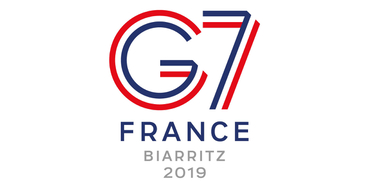The G7 French presidency released on 17 December 2019 the Biarritz Progress Report on G7 development and development-related commitments which takes stock of the G7 commitments contributing to the Sustainable Development Goals (SDGs).
The Biarritz Progress Report welcomes the leading role of the G7 in addressing major global challenges (climate change, education, gender equality, health, international stability). It acknowledges that G7 countries collectively represent the largest suppliers of Official Development Assistance (i.e. USD 114 billion in 2018) and are a driving force in the mobilization of other public and private financing for sustainable development. The report discusses G7 leadership to advance concrete solutions, as evidenced by the success of theGlobal Fund to Fight AIDS, Tuberculosis and Malaria (to which the G7 countries are the main contributors), the Global Partnership for Education, the Muskoka Initiative for Maternal, Newborn and Child Health, or the l’Aquila Food Security Initiative.
The Biarritz Progress Report stresses that the G7 needs to pursue its efforts in order to respond to increasing inequalities at global scale and within countries, in close cooperation with partner countries, international organizations, civil society and the private sector, so as to contribute to successfully achieving the SDGs by 2030. It identifies several commitments made by the G7 leaders that require further investment, including the reduction of biodiversity loss and marine litter, trade facilitation in developing countries and the fight against food insecurity, which still affects more than one quarter of the world population.
Read the Biarritz Progress Report
Since 2009, the G7 has produced a comprehensive report every three years reviewing progress on all G7 development commitments, along with sector-focused accountability reports in interim years. The Biarritz Progress Report if the fourth comprehensive accountability report in the history of the G7 after Muskoka in 2010, Lough Erne in 2013 and Ise Shima in 2016. It was elaborated by the G7 accountability working group, composed of development experts from member countries, who met in Paris three times in 2019. It covers 48 development and development-related commitments agreed upon by the G7 Leaders, in ten thematic areas: aid and aid effectiveness, economic development, health, food security, education, equality, governance, peace and security, environment and energy and human mobility.
